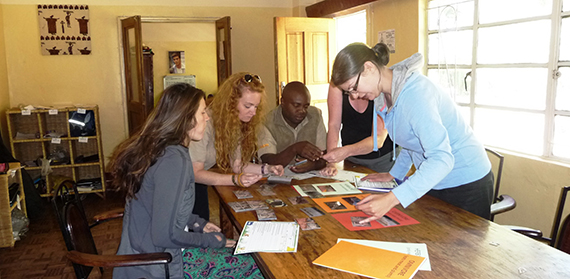by Jackie Abell
Well, June has been about education! This month I have had two researchers from Coventry University, Donna-Lynn Shepherd (PSI-CAB) and Gemma Tombs (DMLL), working alongside me here to implement a conservation education programme which we hope will transform young attitudes and behaviours towards wildlife in Zambia.
But why do we need to do this at all?
Human-wildlife conflict is a serious issue across Africa. As the human population increases, available space becomes a problem. Human populations move into wildlife areas and change habitat. Buildings appear, land is turned over for farming, prey animals disappear, and predators find themselves competing with humans for space and food. Retaliation for livestock lost to lions, and crops and homes trampled by wild elephants is undertaken by people upon the wildlife itself. Here in Livingstone Zambia, wild elephants are subjected to fireworks and gun-shots as local people try to deter them away from their homes, families and businesses. Just across the Zambezi River and into Zimbabwe, local people are not only in conflict with the elephants but also wild lions. The stakes and risks are high. Consequently conservation organizations invest time and research into trying to find ways to address this human-wildlife conflict to protect people and wildlife.
A big part of this is education. We need to change attitudes towards wildlife. As many psychologists will tell you, a change in attitudes needs to include a change in behaviour. To achieve both here in Africa, there has to be benefits attached to doing so. It isn’t just knowledge about wildlife behaviour that’s needed (such as knowing how to keep your cows safe from predation at night) but the value of protecting wildlife to those local people who live with the risks of doing so.
ALERT are involved in providing voluntary school classes in conservation education. We are doing this in one school in Zambia (Mukamusaba), one school in Zimbabwe (Chamabondo Primary School) and our own ALERT Education Centre also in Zimbabwe. Attendance at these classes can be high, with numbers exceeding 80 children per class. What we want to know is the extent to which this education is impacting upon young people’s attitudes and behaviours to the environment and conservation in the short and long-term. Moreover, we’re keen to create more practical and interactive learning into schools that do not rely on having lots of resources. There’s no electricity and no plug-sockets. If we’re to use technology here, we’re going to have to get creative!
Thankfully, a team of experts from Coventry University are assisting us with this work. Using a problem-based learning approach, designed by Professor Maggi Savin-Baden (DMLL) with help from the DMLL and PSI-CAB team, an initial 6 week conservation education programme has begun. A questionnaire and cognitive interviews to assess a range of attitudes towards conservation and values has been carried out this month with the children at Mukamusaba (aged 11-17) prior to our educational intervention. Culturally-appropriate versions of this questionnaire have been piloted in the UK and Canada. A control group of children here in Zambia, who have never received any conservation education, will also be receiving the same questionnaire. After 6 weeks of the PBL programme, these children will be re-assessed to see what difference, if any, we have made. Future assessments will assess behavioural changes in the short and long-term. The aim of this research is to design a 12 month course that can be rolled out across schools in Zambia and Zimbabwe. I’ll let you know what we find from our initial 6 week programme.
Donna-Lynn and Gemma have visited some of the urban and rural schools we work with in Zambia and Zimbabwe. Amidst the deprivation, they’ve also met children desperate to learn, and language and technological barriers to hurdle. The challenge for us is to pool our expertise and maximise the positive impact we can have on these children’s lives. Later I’ll tell you about the other ways in which Coventry University and ALERT are hoping to help some of those communities we need to work with for lions and other wildlife to have a future. The future of Africa’s lions is inextricably tied to the future of its people.




Comments are disabled